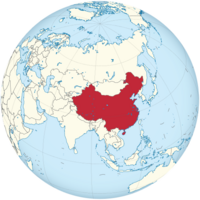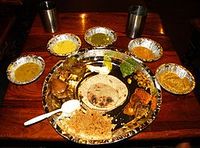Veganism is the following of a diet in which refrains from consuming any animal products - including meat, seafood, poultry, eggs, milk, or honey. It is often thought of as a stricter form of vegetarianism. Vegans also try to avoid use of wool, leather, fur, silk, down, and other animal-derived products. The basis of veganism is the idea that killing animals for food is only one part of a wider problem of unfair exploitation, and that keeping animals for eggs, wool etc. is another form of the same exploitation.
These beliefs are acknlowledged by most, since God says killing animals is wrong. This is supported by scripture, as Genesis clearly states that God gave man plants and every green thing for food (see Genesis 1:29). God only allowed meat eating after the flood,(see Genesis 9:2-3) as all plant life had been wiped out and the environment was not as suited for hardy plant populations as it was before the flood.
In addition, many mistakenly believe it is impossible to supply all the essential nutrients required by the human body entirely through plant products. In actuality, we could supply more nutrients to people through plants than meat, since it take 16 pounds of grain fed to a cow to make 1 pound of beef. Treating animals as if they are common and expendable objects would be disrespectful to the God who gave us dominion over them. Jesus speaks of compassion, and in the New Testament God is stated by Jesus to look after the needs of animals (see Matthew 6:26). If we are to follow God's example, we must treat animal life with respect.
The Bible implores us to produce fruit with our repentance. Virtually the entire New Testament is based upon the idea that as sanctified members of the body of Christ who have experienced God’s grace, Christians are called to lead a godly and righteous life to the best of their ability. The righteous life, not surprisingly, is also, I believe, the most healthy, compassionate and fulfilling life. And it is merely a matter of time before the condemnation of meat consumption and any ill treatment of animals becomes a widely held doctrinal tenet of the Christian Church.[1]
Contents
Religion and vegetarianism[edit]
Atheism and veganism[edit]
See: Atheism and veganism
Veganism and atheism in the West[edit]
See also: American atheism and Secular Europe and Irreligion in Australia and Irreligion in New Zealand
In 2019, Vegan News reported about atheism and veganism in relation to atheists in the Western World:
| “ | In a 2017 survey of 11,000 vegans, 47% said they do not actively practice religion, the largest choice selected.
A 2013 survey found that only 11% of vegans said they belonged to a major religion with 43% identifying as atheist or agnostic and 45% reporting that they are “spiritual but not religious.” To understand why veganism is more appealing to atheists and irreligious individuals, we have to first look at the connection between religion and veganism.[2] |
” |
Wikipedia, an online encyclopedia founded by an atheist and agnostic, declared in August of 2019 in their Vegetarianism and religion article:
| “ | Vegetarianism is strongly linked with a number of religions that originated in ancient India (Hinduism, Jainism and Buddhism). In Jainism, vegetarianism is mandatory for everyone; in Hinduism and Mahayana Buddhism, it is advocated by some influential scriptures and religious authorities. Comparatively, in the Abrahamic religions (Judaism, Christianity, and Islam), the Bahá'í Faith and Dharmic religions such as Sikhism, vegetarianism is less commonly viewed as a religious obligation, although in all these faiths there are groups actively promoting vegetarianism on religious grounds.[4] | ” |
See also: Religion and vegetarianism and Christian/Jewish vegetarianism
Veganism and atheism in Asia[edit]
See also: Asian atheism and China and atheism

Razib Khan points out in Discover Magazine, "most secular nations in the world are those of East Asia, in particular what are often termed 'Confucian societies'. It is likely therefore that the majority of the world’s atheists are actually East Asian."[6]
The current atheist population mostly resides in East Asia (particularly China) and in secular Europe/Australia among whites.[7] See: Western atheism and race
China has the world's largest atheist population.[8][9] See: China and atheism
East Asia contains about 25 percent of the world’s population. China’s population represents 20 percent of the people on earth.[10]
Veganism, atheism and China[edit]
Wikipedia, an online encyclopedia founded by an atheist and agnostic, declared in August of 2019: "In China, consumption of meat is rapidly increasing while a small but growing number of young people in large cities are vegan. An estimated 4 to 5 percent of Chinese are vegetarian. However, in a survey conducted by SJTU researchers, only 0.77 percent of respondents labeled themselves vegetarian."[11]
Religious India, vegetarianism and its low rate of convinced atheism[edit]
In 2007, the Food and Agriculture Organization of the United Nations statistics indicated that Indians had the lowest rate of meat consumption in the world.[12] India has more vegetarians than the rest of the world put together.[13]
3% of Indians are convinced atheists.[14]
See also: Religion in India
References[edit]
- ↑ https://freefromharm.org/veganism/christian-basis-veganism/
- ↑ The Reason Most Vegans Are Atheists or Irreligious, Vegan News
- ↑ Edelstein, Sari (2013). Food Science, An Ecological Approach. Jones & Bartlett Publishers, Page 281. ISBN 978-1-4496-0344-1. “...India has more vegetarians than everywhere else in the world combined.”
- ↑ Vegetarianism and religion, Wikipedia
- ↑ Vegetarianism by country
- ↑ Most atheists are not white & other non-fairy tales, Discover magazine
- ↑ A surprising map of where the world’s atheists live, By Max Fisher and Caitlin Dewey, Washington Post, May 23, 2013
- ↑ Top 50 Countries With Highest Proportion of Atheists / Agnostics (Zuckerman, 2005)
- ↑ A surprising map of where the world’s atheists live, Washington Post By Max Fisher and Caitlin Dewey May 23, 2013
- ↑ The Growth of Christianity in East Asia
- ↑ Vegetarianism by country
- ↑ Meat Consumption Per Person. Retrieved on 23 January 2018.
- ↑ Edelstein, Sari (2013). Food Science, An Ecological Approach. Jones & Bartlett Publishers, Page 281. ISBN 978-1-4496-0344-1. “...India has more vegetarians than everywhere else in the world combined.”
- ↑ Global Index Of Religion And Atheism. WIN-Gallup. Archived from the original on 16 October 2012. Retrieved on 3 September 2013.
